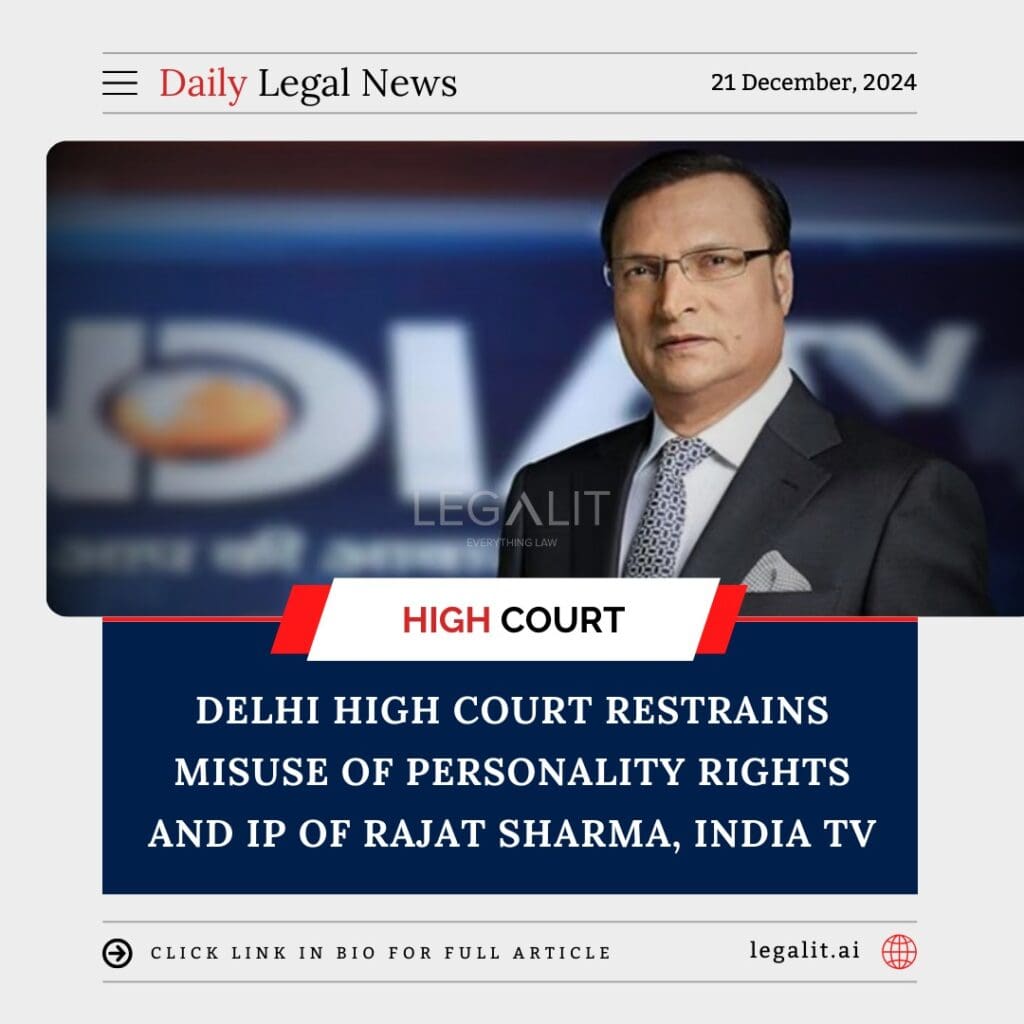
The Delhi High Court has issued an interim order restraining the misuse of personality rights and intellectual property (IP) associated with Rajat Sharma, the founder of India TV, in a case involving unauthorized use of his likeness and media content. The order aims to protect Sharma’s personal and professional image, acknowledging the importance of safeguarding such rights in the age of digital media and entertainment.
Background
Rajat Sharma, a well-known media personality and founder of the popular news channel India TV, filed a lawsuit against a group that had been using his image, name, and content without permission. The plaintiff contended that the defendant entities had been exploiting his likeness and media content in advertisements, publications, and digital platforms, causing potential harm to his reputation and intellectual property rights.
The case involved allegations of unauthorized usage, highlighting the increasing challenges of protecting personal and intellectual property rights in an era where media content can be easily reproduced and distributed. The case brought into focus the legal landscape around the protection of personality rights and the growing significance of IP laws.
Key Arguments
Plaintiff’s Stand
- Violation of Personality Rights: Rajat Sharma argued that the unauthorized use of his name and image for commercial purposes was an infringement of his personality rights, which protect individuals from exploitation of their image and reputation without consent.
- Intellectual Property Infringement: He contended that the defendants’ actions constituted a violation of his IP rights, including those related to content created for his media ventures, which are protected under copyright laws.
- Impact on Reputation and Brand: Sharma highlighted that the misuse of his likeness and media content without consent was leading to confusion among the public and diminishing the value of his personal and professional brand.
Defendant’s Stand
- No Malicious Intent: The defendants argued that their actions were not intended to harm the plaintiff but rather were part of commercial promotions. They contended that the use of Sharma’s likeness and content was incidental and did not fall under the purview of personality rights or IP violations.
- Freedom of Expression and Commercial Use: The defendants maintained that the use of public figures for advertisements falls within the scope of freedom of expression and public interest, and their actions should not be classified as IP infringement.
Court’s Observations
The Delhi High Court emphasized the growing relevance of personality rights and IP in the context of modern media and technology. It noted that while public figures do not forgo their rights to control their image or content, the legal boundaries surrounding these rights need to be clearly established in the context of modern digital platforms.
- Balance of Rights: The Court observed that it was necessary to strike a balance between freedom of expression, commercial interests, and the protection of individual rights against misuse.
- Interim Relief: While the case continues, the Court issued an interim injunction restraining the defendants from further use of Rajat Sharma’s likeness, name, and intellectual property.
Legal and Policy Implications
- Protection of Personality Rights: This ruling underscores the importance of safeguarding the personality rights of individuals, particularly public figures whose images and content are often commercially exploited.
- Growth of Digital Media: As the digital landscape evolves, this case could set important precedents for how personality rights and IP are protected across various online platforms, including social media and digital marketing.
- Impact on Intellectual Property Laws: The judgment is expected to clarify the scope of IP laws concerning the protection of personal images, brand value, and media content.
Conclusion
The Delhi High Court’s interim order marks a significant step in the protection of personal and intellectual property rights of public figures in India. The case could shape future legal frameworks for how personality rights and IP are handled in the digital age, ensuring that individuals retain control over their likeness and media content in an ever-expanding media environment.